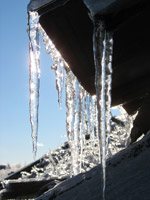
| Great Lakes Ice Disappearing | 30 March 12 |
 A new report published by the American Meteorological Society confirms what people living near North America's greatest fresh water resource have long observed: because of climate change, Great Lakes ice is in severe decline.
A new report published by the American Meteorological Society confirms what people living near North America's greatest fresh water resource have long observed: because of climate change, Great Lakes ice is in severe decline.The report used a combination of satellite photos and Coast Guard scanning from 1973 to 2010 to determine Great Lakes ice cover has dropped by an average of 71 per cent. Lake Ontario had the greatest loss of ice cover, while Lakes Erie and St. Clair had the least amount of ice cover loss. Reduced ice can speed up winter evaporation and lead to lower water levels, which can then leave the shoreline exposed and more vulnerable to erosion. The loss of ice can also signal earlier algae blooms, which harm water quality and the marine habitat. The study doesn't take the most recent winter into account, but the trend is continuing. Only about 5 per cent of the Great Lakes' surfaces froze this winter – well below the 40 per cent average. Thunder Bay Ontario Port Authority CEO Tim Heney, said the lack of ice is remarkable. "It's the first time I ever remember the water being open right into Thunder Bay. I've never seen this before." "What's happening on the Great Lakes is an immediate reminder that our climate is changing and the expectations that we've had in the past aren't going to hold true for the future," said Lakehead University geography professor Adam Cornwell. View February 2012 American Meteorological Society Journal articleView March 14, 2012 Inhabit.com coverage View March 13, 2012 CBC coverage View March 13, 2012 Montreal Gazette coverage View March 10, 2012 MSNBC coverage Source:
Inhabit.com, CBC
|
|
 Print version Print version |
Top |
